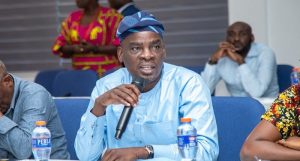
Minister of Education Haruna Iddrisu has reaffirmed his directive for teachers to use Ghanaian languages as the medium of instruction at the early stages of basic education.
He said the move is essential for improving learning outcomes at the foundational level.
According to the minister, research supports the idea that children learn better when taught in a language they understand.
He was speaking when he called on the management of the National Council for Curriculum and Assessment (NaCCA) in Accra on October 25.
“My understanding is that I made some comments and gave a directive — and I absolutely stand by it. The Ghana Education Service must uphold the learning environment and instructional standards as vital parts of improving foundational learning. As much as we all agree that we should go beyond literacy and numeracy, we must still get the basics right,” he said.
Clarifying the scope of his directive, Mr. Iddrisu explained that the use of local languages as the medium of instruction would apply from kindergarten to grade six, emphasising that children should first master their native languages before transitioning fully to English.
“We are moulding character and behaviour. My directive on teaching in Ghanaian languages is meant for clarity—from kindergarten to grade three, the language of instruction should be a local Ghanaian language,” he stated.
“That child was not born an English child. A child comes to school already socialised in their native language, and this will help them acquire English as a second and formal language. However, we will limit it to Grade Three.”
The minister added that the ability to read and write by Grade Three is a critical benchmark for educational progress.
“Even after Grade Three, if a child cannot read and write, then there is something wrong with our educational system. Every Ghanaian child up to Basic Three should have a good foundation in literacy and numeracy,” he emphasised.
On discipline, Haruna Iddrisu also backed the Ghana Education Service’s decision to strictly enforce rules on students’ appearance, including hairstyles and dress codes.
“For discipline, uniformity, and character formation, students must adhere to school rules. After a certain age, they can wear what they like—but not at the basic or secondary level,” he said.
“I demand cooperation and support from parents for the GES to strictly and religiously enforce these rules. If we give in to hairstyles today, tomorrow it will be shoes, and the next day, something else. We have to enforce the rules,” he stressed.
 Uniquenewsgh.com News, Politics, African News Updates & More
Uniquenewsgh.com News, Politics, African News Updates & More



